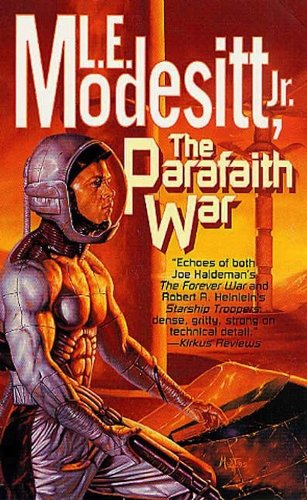
![]() The Parafaith War by L.E. Modesitt Jr
The Parafaith War by L.E. Modesitt Jr
In our far future, a young man named Trystin Desoll is a soldier in the long war that his high-tech civilization has been fighting with the Revs, a society of religious zealots. The Revs, who are outgrowing their own planet, believe that the Eco-Techs are sinful because they use brain implants and other technology to improve their bodies. Therefore, the Revs think it’s permissible for them to wipe out Trystin’s civilization, and they’ve been trying to do this for decades.
Trystin is rising rapidly in the Eco-Tech military. He’s smart and courageous, but he also feels like he has an extra burden to prove himself because, being blonde and blue-eyed, he looks a lot more like the Revs than the dark-haired, dark-eyed people of his own society.
All this — his intelligence, bravery, and coloring — make Trystin the perfect spy. When his nation realizes there’s no way they can win a generations-spanning war against a society who believes it’s their duty to keep “being fruitful and multiplying,” they need to consider some new tactics. Thus, they send Trystin to the Revs’ planet and tell him to assassinate a top official. Not seeing how this is going to stop the war, Trystin comes up with his own idea.
I liked the premise, the basic plot, and the intriguing messianic-themed ending of The Parafaith War (1996). There are some interesting parallels to our world and L.E. Modesitt, Jr. has something to say on such topics as ethics, prejudice, religion, and terrorism. I also like how Modesitt’s female characters are strong, smart, and competent. 
But numerous problems kept me from enjoying the book as a whole. The main problem is that the story of Trystin’s trip to the Revs’ planet only begins in the last 30% of the book. Until that point, we watch Trystin doing a lot of military training with occasional trips home to visit his family. I liked the way that Modesitt used the trips home to give his hero more depth, but the training was repetitive and dull. There were lots of exercises and maneuvers as well as questioning from his teachers:
“How would you tell a stressed accumulator from one that wasn’t?”
“I don’t know,” Trystin confessed.
“There are ways. Some are in the tech library. Some are in the minds of better techs. I won’t tell you. I’m not being cruel. I’ve told pilots before, and most never remembered. So I don’t. The ones who want to live go find out.”
If I had been learning something relevant to the real world, I wouldn’t mind some teachiness, but this stuff was pretty boring and I found myself tuning out sometimes.
Then there’s the bizarre way that Modesitt seems to document every sip of tea or Sustain (a high energy drink) that Trystin takes…
Trystin took another swallow, almost a gulp of the tea.
This happened so frequently that I thought maybe something relevant was going to happen, like he’d become addicted to the Sustain and have problems when he went to the Revs’ world, but nothing came of it. There were also countless described incidents of Trystin rubbing his nose, sweating, blotting his forehead, and other mundane mannerisms. (I have noted this before in Modesitt’s work.) I find this extremely irritating and it kept throwing me out of the story as I’d almost literally cringe each time it happened. Also jolting is the numerous instances where words such as CRACK! THUD! CLING! PING! CRUMPT! are used as sound effects. One last annoying thing (sorry) is Trystin’s much-mentioned thought that anyone who is religious must be an idiot. The Rev’s beliefs are a mélange of several identifiable real-world religions (mostly Islam and Mormonism, I think) so, if you’re religious, be prepared to take offense.
So, even though I liked some of the plot of The Parafaith War, mostly the experience was either boring or irritating. The audio version, recently produced by Tantor Audio, is nice. It’s just over 16 hours long and Joel Richards does a good job with the narration. I’d recommend this version if I felt like I could recommend the book at all.



Wouldn’t it be refreshing if one of these “religious people are stupid” characters had a flash on insight one time and thought, “Wow, I’m just as bigoted as I accuse them of being?”